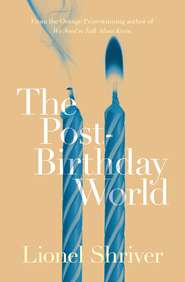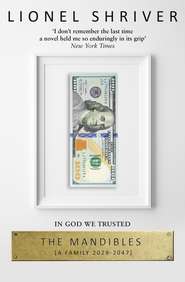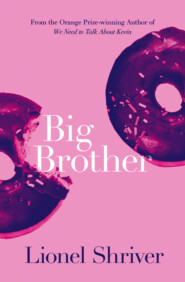По всем вопросам обращайтесь на: info@litportal.ru
(©) 2003-2024.
✖
A Perfectly Good Family
Автор
Год написания книги
2018
Настройки чтения
Размер шрифта
Высота строк
Поля
Hugh sighed. “With the ACLU, you got two choices,” he announced when we’d finished bickering. “You can all chip in and buy out the organization’s share as a family—” He scanned us skeptically, as if regarding our trio as a cohesive collective unit were risible—“or you can sell.”
“We’re not selling,” Truman declared.
“That may be something you have to decide with your brother and sister.”
“I live there!”
“For the time being, kid.” Mordecai played with an alligator clip that fixed his braid and worked the jaws up and down.
“Should you retain the property with the non-profit paid off, then you three could decide how or whether to dispense with the real estate at your leisure.”
“The last thing some of us need,” said Mordecai, cutting his eyes toward Truman, “is more leisure.”
“What if two of us have some feeling for the house we grew up in,” Truman hypothesized, “but all the other guy cares about is his filthy lucre?”
“If you can raise the funds, two of you buying out the third is one option—”
“Hold on here,” Mordecai railroaded. “You’re saying with the bastions of social justice out of the picture our jolly threesome can blather for months if not years about what happens to Mommy and Daddy’s $380,000 ramshackle mansion—?”
“It’s not ramshackle!” said Truman.
“And meanwhile little True here makes up his bed in my house every morning and waters the petunias and grows old. Isn’t there any way to push this program?”
“You’re any of you within your rights,” said Hugh, “to file suit for partition.”
“So that what,” I said hopefully, “the house is divided up and we each get a floor?”
“Physical partition is recommended once in a blue moon, but unlikely in your case. I dare say the court would regard awarding one floor each to grown siblings as a re-enactment of the Civil War. No, ordinarily the court demands the property be put up for auction. Any of you current part-owners would be free to bid for the house, though in competition with each other or the buying public, either of whom could jack its price out of reach.”
This was getting too complicated for me. “Mordecai, come over to the house for dinner tonight,” I suggested. “We’ll sort something out.”
“My ass we’ll sort something out.” said Mordecai. “Your kid brother just wants to sit on his hands and keep his little upstairs hideaway intact like a fucking treehouse. And meanwhile my company’s scraping along by the seat of its pants—”
“You’ll get your damned money!” Truman’s face was violet.
“There’s one more thing,” Hugh raised reluctantly, “befere we break up and I let you three amicably confer on what you want to do about the real estate.” He didn’t look envious; I got the impression that if I invited the attorney to our dinner Hugh would suddenly recollect a previous engagement. “Mordecai … You borrowed some money from your parents?”
“A pittance,” my brother replied guardedly. “Why?”
“Say—$14,000?”
Mordecai sniffed. “I doubt it was that much.”
“If you question the amount, we could verify with back records. “Cause the loans are to be deducted from your inheritance.”
I did not think it possible for a man of Mordecai’s coloring to pale. True, to my parents $14,000 was a stupendous amount of money. They’d never lost touch with the depression dollar, just as I had never quite debunked the exaggerated value of our twenty-five-cent allowance; a quarter still weighed heavy in my hand. But in terms of 1992, the amount was modest. Forgive your debts? So my parents were second-rate Christians like most, and that was hard to swallow when they had just piously donated a quarter of their estate to a child who was only an abstraction. They could be charitable as long as the generosity wasn’t toward a real, obstreperous issue who used the f-word. Strictly, the deduction was fair, but I suspected my brother had interpreted the word “loan” loosely.
“See for yourself.” Hugh handed a sheet to Mordecai.
“May 10, 1989,” he muttered, locating the amendment. He turned to me. “What did I do then?” He handed the paper back the way Truman had held my mother’s stinky sponge.
“Now listen. Mind if I leave you three with a bit of advice?” Hugh inquired, perhaps having noticed that we hadn’t asked for any. “I’ve probated wills like this before; your situation ain’t unusual. The simplest solution is almost always the best. I know a house has memories, but memories you can keep for free. With this many tenants, I strongly suggest that you sell.”
Trying to keep him from spontaneously combusting in public, I quickly herded Truman to reception.
chapter four (#ud4ac319c-efa5-510d-893a-df914bb12a31)
As we collected back on Hillsborough, Truman loitered a few feet away, a bullish, belligerent aspect disguising the same lost and stricken countenance he displayed when he was four. It would have been like Mordecai to woo us to one of the pricey eateries that had sprung up in Raleigh while I’d been gone, where he could stage the profligate debauch for which he was renowned around town; glaring from a distance, Truman apparently found his brother’s enthusiasm for meeting up later at Heck-Andrews suspicious. Truman had grown so fiercely protective of our house that he didn’t invite guests of any description, much less his big brother.
But I rather liked Mordecai’s effect on my former sidekick; once our trio parted ways and the two of us returned to the Volvo, Truman clapped a hand on my shoulder and said, “What a mess!” in a tone that suggested that at least it was our mess, together, and then asked if I wanted to drive; for the first time since my arrival I felt he was glad I was there. In the car, too, we had a feast of things to talk about, starting with that charitable bequest.
“Don’t that beat all!” said Truman, quoting our childhood favorite, Andy Griffith, who resembled our father.
“Cutting in the ACLU was totally predictable.” I said. “It’s surprising those first amendment flunkies didn’t walk off with the lot.”
“Mordecai embarrassed me. Comes into money from parents he never gave howdya-do and then complains it’s not enough.”
“Mordecai feels chronically shafted.”
I had promised to lay in provisions for Mordecai’s “secret recipe” spaghetti sauce. Soothed by the shimmy of our cart in Harris Teeter, my little brother cheered up. While many find shopping tedious, Truman looks forward to Harris Teeter all week.
“I know this sounds crazy,” he confided by the paper towels, “but I love running out of supplies so that I can replace them.”
I’d seen it: the shine in his cheeks when he lathered a soap splinter, from satisfaction it was his last bar; the flourish of his hand when he vanquished the tarragon so he could buy a new jar. When he collapsed a box of Total into the bin he spanked his palms, as if he’d accomplished something. Truman liked to have needs. At least the illogic wasn’t lost on him, but I wondered if this delight in dispatching products in order to re-acquire them wasn’t a functional definition of the middle class.
Consequently, as our cart mounded my brother’s chest expanded and his step sprang—shopping, he was concentrated, efficient, authoritative about brands of tinned tomatoes. In a grocery store, Truman was pig in shite.
We returned having agreed it was time to move operations to the main kitchen. Truman took obvious relish in unpacking. Although I was sometimes frustrated by the close perimeters of his life, within those boundaries he thrived. Maybe to him who celebrates a fresh jar of mayonnaise belongs the kingdom of heaven. Truman shoved the Winn-Dixie ketchup aside for proper Heinz, swept away the broccoli rubber bands, and set about alphabetizing the spice rack. This would be the first time he’d cook here since my mother died, a festive and solemn occasion both. Truman had ambitions to enlarge his world by exactly two floors.
As he burrowed in the pantry, Truman’s high spirits precipitously dropped when the back door slammed. He turned to confront, among his nutritionally correct carrots and ten-pound bag of Carolina long grain, a liter bottle of aquavit.
Hee-hee-hee …
Truman’s face folded down like a garage door. Truman claimed to dislike his brother; I thought his dislike was occluded by terror.
I suggested we all have a drink before preparing dinner. Brothers beelined for opposite corners of the parlor, Averil taking the love seat behind her husband’s chair so that her view of her brother-in-law was physically blocked. She picked up a copy of The Christian Century and looked rapt.
When I solicited Truman with a glass of wine, I found him hunched over a piece of stationery. I recognized the sheet with its black border as the bill for our mother’s funeral expenses. (Exorbitant—I suspect that out of sheer frugality she’d have preferred we bury her in the backyard, like a beloved dog.) He scribbled additions and divisions, tortoiseshell reading glasses down his nose.
I brought Mordecai a shot of aquavit, whose single ice cube he fished out and threw in the fireplace. He raised the glass to the lamplight and squinted through his yellow-tinted lenses at the mere finger remaining, knocked it back, and returned the empty glass. I soldiered to the kitchen where the bottle was lodged in the bulging stand-up freezer. I wondered if he really liked caraway schnapps, which smelled like liquor fermented from a ham sandwich, or whether what he liked was the fact it was repulsive.
On a whim I took down my mother’s last grocery list, scrawled on old “Bob Scott for Governor” notepad paper and still magneted to the refrigerator door, and pulled a nubby pencil from a drawer. I had an itch to make my own calculations. The chart I constructed on the back of the list so amazed me that I wondered at having never drawn it up before:
By way of explication: every child has sooner or later to face down the farcical liberal fiction that his parents love each child equally well, a myth Sturges and Eugenia enshrined in their will, as if to convince themselves. Bullshit. Parents have favorites. Mine did their best to camouflage these preferences, my father by being indiscriminately aloof, my mother by being indiscriminately clingy. But as Sturges McCrea had himself opined, prejudice will out.
Hence my chart. If we counted the ACLU as the fourth child and allowed each parent to rank the McCrea kids on a preference scale from 1 to 4, we all four earned exactly five points. I had to admire the symmetry, contrived by two people neither mathematically minded and only egalitarian in an official sense. My father fought for justice his whole life, so naturally my parents would mete out love along with the real estate in equal portions.
Though Mordecai’s glass was beginning to sweat, I paused to study my handiwork. Unquestionably, the ACLU came first in my father’s affections; it did not wet the bed or require a ride to the school play when he planned to take the car. There was equally no question—and I say this in my mother’s defence—that however faithfully she parroted his views and encouraged his checks out the door, for my mother the ACLU straggled in a far fourth. She was incapable of getting exercised over progeny she couldn’t treat to a Popsicle, a ward who would never arrive at the back door trying to hide his report card or waving the winning essay on the school cafeteria. She was a real mother.











